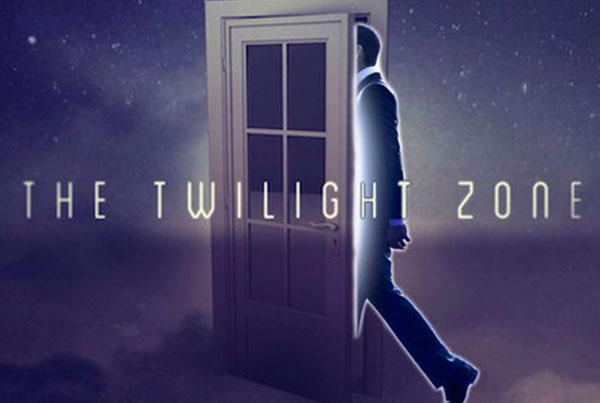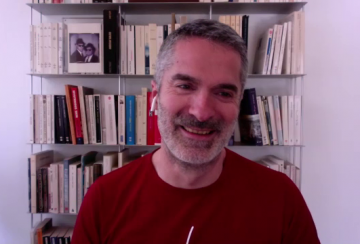The Twilight Zone
The right dimension
Serie. Jordan Peele, Get Out’s and Us’ director, was the ideal candidate to reboot the TV 60’s masterpiece. We explain why.
Text and interview by Caroline Veunac
![]() Reading time 3 min.
Reading time 3 min.
A stressful music, a door opening in the middle of space, an hypnotist’s voice whispering into our ears “There is a fifth dimension beyong that which is known to man”… Created in 1959 after Alfred Hitchcock left CBS for NBC, and multi broadcasted during decades everywhere in the world, The Twilight Zone, its original title, rocked the childhood of several generations of series’ addicts. There’s nothing like a good horror story before going to bed, and Rod Sterling, creator and narrator of this mythical anthology, was an expert in TV fear. Sixty yearsl ater, we’re going to make nightmares again: the TV masterpiece comes out of the woodwork, thanks to Jordan Peale, the successful director of Get out and Us.

A Martian can say things
a Republican or a Democrat
cannot say
The connection seems natural. In the 60’s, Rod Serling revolutionizes TV fiction using genre- SF, fantastic and horrific- in order to share on a mainstream medium his really dark vision of the after-war American society. To him, « a Martian can say things a Republican or a Democrat cannot say”. War veteran probably suffering from PTSD, who became a TV left-wing scriptwriter he turns simple aliens’, robots’ and space-time stories into a collection of existential and humanist tales. In one of the most striking episodes, The Monsters are due on Maple Street (season 1, episode 22), the panic of a residential area afraid to be invaded by aliens symbolizes the McCarthyist’ paranoïa. In The Shelter (season 3, episode 3), it’s the fear of bombs and its effects on national cohesion that are summed up in the story of a group of friends tearing apart in order to acess a fallout shelter…
Black Mirror and Twin Peaks owe him very much
Jordan Peele did’nt wait to reboot The Fourth Dimension to apply Serling’s recipe. Get Out and Us, his two horrific popcorn movies with thick underlying meaning, could somehow be long episodes of The Twilight Zone. But narrated form the point of view of a black man in a country still full of social inequalities and supremacist ideas. Former comic (he was the other half od the funny duo Key & Peele) who became a pop and activist director, Jordan Peele has a talent for imagining playful objects with a twist at the end, whose political moral is cleverly made to explode in the face of Trump’s America. In Get Out, the nightmare of a black young man held prisoner by his white partner’s family points out the retained racism of left-wing middle class. In Us, terrifying doppelgängers with dislocated diction taking a rich family hostage are the voice of an America with outsiders.
Matrix serie, The Fourth Dimension marked Shyamalan and J.J Abrams’ generation for life, and influenced dozen of films and series, from The Sixth Sense to Lost, from Twin Peaks to Westworld. It has already its self-proclaimed heirs, starting with stressful Black Mirror, that also adopts the anthology’s format so as to foretells the excesses of numerical technologies. Jordan Peele is not the only one to share with Rod Serling the conviction that imaginary and entertainment are powerful vehicles to reflect and impact the collective unconscious. Yet, among The Fourth Dimension‘s children, the new box office’s prince seemed to be the best to take over. The man whose political anger, at this precise moment of the US history, seemed to be the most appropiate with the major intention of Rod Serling’s masterpiece.
A new dimension
The Twilight Zone has already been rebooted twice but it wasn’t convincing. In 1985, the Fifth Dimension on Channel 5 in France, and in 2002, The Thirteenth on 13e Rue. Then there were high expectations. And the result is not disappointing. In two inaugural episodes, The Twilight Zone 2019 proves sboth its perfect comprehension of the original serie’s identity and its ability to modernize it. Right from the first episodes, that tells the story of a stand-up comedian too politicized to be funny, that seals a Faustian deal in order to manage to make its audience laugh, Jordan Peele uses his own activist entertainer’s image. “If you can’t make people think, then your sketch has no point“, he makes his hero say. But this belief that could be his own, the author-director takes perverse pleasure in turning it over so as to denounce the deadlock of the race for success, as a response to the detractors who caricature him in the marketing’s king.
It also triggers a reflection on the issue of possession of firearms, post Me Too, the finance’s reign and minorities’ persecutions. As for the second episode, inspired from Nightmare at 20,000 feet, directed in 1963 by Richard Donner for the original The Fourth Dimension, it displays a journalist who, during a flight, believes he can avoid a disaster if he relies on a podcast’s premonitions. Fear of the other, weakening of social cohesion… The themes are evoked with perfect flow, without any artefact or time out. Maybe Jordan Peele is even more confortable with TV format, forcing him to come faster to the end of concepts that are sometimes too long in his films. His Fourth Dimension is both meta (the show even manages to quote itself right from the second episode!), joyful and terribly topical. Rod Serling won’t turn in his grave.
- Jordan Peele
- Twilight Zone
- Serie
- Remake
Voir aussi


